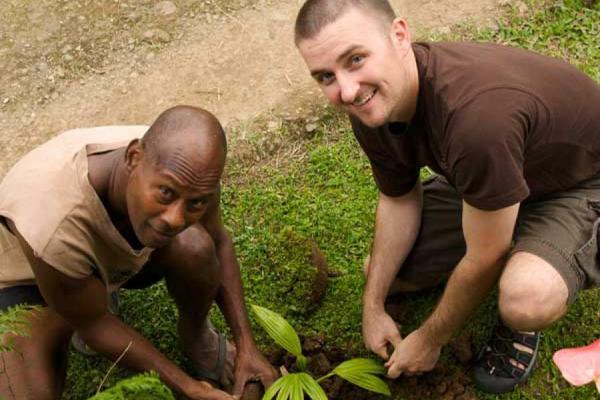It is 40 degrees in Siem Reap and Aki Ra has recently returned from the jungle. Young orphan monkeys climb up his leg, fighting for his attention as his wife kisses him hello. His legs are grey with dust from the dry unpaved roads. His face looks tired, victimised by the day’s high humidity. Yet, he is more than happy to show me around his home, The Landmine Museum of Cambodia, where he collects and displays diffused relics of war.
He works for free removing an average of 25 mines a day, his life in paradox with his past. Much of his work comes from removing landmines he may have laid as a child soldier. Over the years he estimates he has laid 20,000 mines while conscripted with three army groups.
Walking between two bamboo stilts, Aki Ra leads the way to an exhibition of deadly devices. The room smells of rust, similar to the scent of caves. In the middle is a tiny box for donations that Aki Ra uses to pay for medical supplies, education and diffusing. To our left are anti-personnel mines which he explains take off one or two legs. He talks of devices from many wars—pineapple mines, fragmentation mines and even tank mines. In one picture a young child holds a diffused mine, his hand pointing to where his leg had once been.
In 1978, at the age of five, Aki Ra’s parents were both killed by the Khmer Rouge for petty crimes. As an orphan, he was taken in by the regime into a lifestyle he then thought was normal. “They had my innocence in their hands and were able to warp it any way they chose,” says Aki Ra. He grew up hungry, living in a world of fear, brutality and hardship. He recalls seeing a man disemboweled for stealing a banana from a tree. The Khmer Rouge made the man an example, the villagers forced to watch, cheer and clap, including the man’s own family. Crying was also illegal. This is what he calls his “education.”
Life as a child soldier was like living in a snow globe. Aki Ra had no understanding of the outside world, believing this life was normal: to fire rocket launchers and carry AK47s at ten. He learned to accept this way of life, living in the propaganda of fear. “The Khmer Rouge taught us that the enemy was always just an arm’s length away,” he says.
Aki Ra is obsessed with deadly devices. He points to a “Bouncing Betty” mine and claims it can kill up to ten people. “The first explosion is at eye level,” he says. “The second one blows up here,” pointing at my vital organs. At last count, Aki Ra has defused over 20,000 landmines—the same number he estimates he laid as a child, many of which are displayed in his museum.
Although an expert de-miner, Aki Ra has to clear landmines in secret. “They don’t make license for me,” he says. He has been arrested for clearing landmines without an NGO license. The government is keen to shed Cambodia’s war-like stigma to attract more tourists and disapproves of his work. Aki Ra acquired his skills for defusing mines working for the UN. After three years with the organisation, he continued on his mission to rid Cambodia of landmines using simple tools—a hammer, shovel and wrench.
Some months he removes upwards of a 1,000 mines, others only 100. Most days, Aki Ra climbs aboard his small motorcycle and travels the countryside in search of landmines. He often responds to requests, clearing farmers’ fields and areas that surround small villages.
Growing up as a jungle fighter for the Khmer Rouge, the Vietnamese army and then the Cambodia army, he has experienced the horrors of many battles. He has lost loved ones and taken lives. With an estimate of over three million landmines left, the horrors of landmines are still prevalent in Cambodia today which kill or maim more than 100 people in Cambodia every month. His museum is a lesson and a reminder. Aki Ra and his wife have adopted 20 children, all landmine victims most of whom have lost limbs. “I work for the people of Cambodia,” says Aki Ra, “I want to make my country safe.”
Add this article to your reading list



